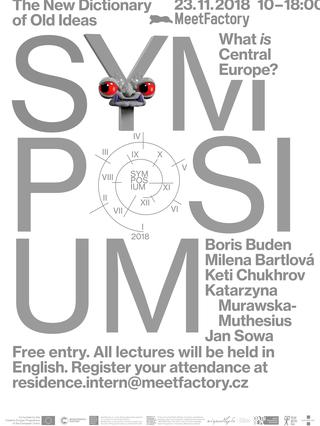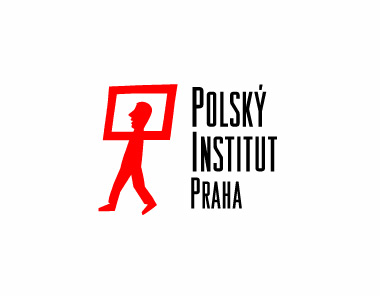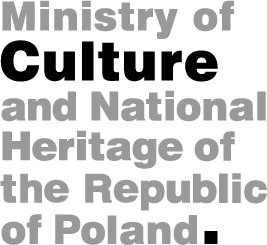 How to get to us
How to get to us
MeetFactory, o. p. s.
Ke Sklárně 3213/15
150 00 Praha 5
GPS:
50.053653
14.408441
Opening hours:
13:00 to 20:00 + based on evening program
Symposium: The New Dictionary of Old Ideas
23. 11.
10:00 -
19:00
Central Europe - a formation between East and West which in the course of centuries has changed its geographic as well as political dimensions several times. Symposium wants to reflect the current cultural and political situation characterized by the rise of nationalistic politics, populism, Euro-scepticism and anti-immigration attitudes in Central Europe from the perspective of contemporary art and theory. This tendency can be observed not just locally but in the whole of Europe. We will foster an interdisciplinary exchange of ideas discussed in a group of art historians, sociologists, philosophers, and art theoreticians.
The symposium is an outcome of the whole year project The New Dictionary of Old Ideas led by Artists-in-Residence program MeetFactory and the beginning of new season of the project founded by Creative Europe".
Program
9:30–10: 00 registration + coffee
10:00–10:15 Opening (Lucia Kvočáková + Piotr Sikora)
10:15–11:00 Milena Bartlová: No Identities, No Art, No Future
11:00 – 11:15 discussion
11:15–11:30 coffee break
11:30–12:15 Boris Buden: Short Life of Post-Communism
12:15–12:30 discussion
12:30–13:45 lunch break
13:45–14:30 Jan Sowa: Populism or Capitalist De-modernization in the Age of Perverse Decolonization
14:30–14:45 discussion
14:45–15:30 Katarzyna Murawska-Muthesius: Mapmaking as Image-making: The Case of East Central Europe
15:30–15:45 discussion
15:45 –16:15 coffee break
16:15–17:00 Keti Chukhrov: The Ruptures and Continuities between Avant-garde and Contemporaneity
17:00–17:15 discussion
17:15–17:30 Closing remarks + Greetings
More info:
Free entry.
All lectures will be in English language.
We cordially invite you to Open Studios that will be the part of the Public House event. It starts at 7pm.
Speakers:
Jan Sowa (PL), Academy of Fine Arts Warsaw and Biennale Warszawa
Populism or Capitalist De-modernization in the Age of Perverse Decolonization.
Liberal optimism of widespread progress and modernization that shaped the mainstream of public debate and intellectual life in the decades following the fall of the Berlin Wall has been put under serious doubts by the recent populist uprisings and related political developments. Democracy and human rights seem in to be in retreat and as the cases of United States, Poland or Brazil have demonstrated, free markets do enjoy the prospect of right-wing authoritarianism quite a lot. Central-Eastern Europe offers some interesting insights into this new condition of global political mind as a lot of current social and political phenomena occurred there earlier and with a bigger force than they do now in the better developed countries in the core of the capitalist world-system. As a matter of fact, the general pattern of universal history put forward by the so called modernization theory in the second half of 20th century – between Lerner and Fukuyama – has been not only disproved, but even reversed by the contemporary social and political developments that can be labelled as de-modernization: it is the periphery that shows the future of the centre, not the other way around. And it is not a bright future. What seemed to be a progressive decolonization of the (semi)peripheries a couple of decades ago gave way to a bizarre perversion in which the critical and progressive conceptual framework of dignity and diversity has been captured to justify obscurantist and reactionary agenda. This troubling turn of events forces us to rethink and redefine anew the old ideas of modernization, progress and emancipation and to re-examine the link between capitalism and socio-cultural modernity.
Milena Bartlová (CZ), Academy of Art, Architecture and Design in Prague
No Identities, No Art, No Future
At the moment, we have to finally face the radical threat there may soon be no future for the world as we have known it due to the climate breakdown. In Central Europe and elsewhere, national identities resurface and are being manipulated by authoritarian politicians in order to offer a false comfort for the insecure masses. Art and its history have been intimately interconnected with national identities for long. Have art and art history anything to offer at the time of the most profound crisis that has ever confronted humanity?
Keti Chukhrov (RU), National Research University Higher School of Economics, Moscow
The Ruptures and Continuities between Avant-garde and Contemporaneity
The avant-gardes – both first and second – brought art to its zero condition, to its sublation. This self-destructive zeal re-instituted art practice as a conceptual work of mind, but also as a radical and revolutionary modes of socialisation. Contemporary art as the Institute of global contemporaneity hijacked the narratives and lexicons of revolutionary emancipation from both avant-gardes. However, it had to integrate them in various forms of neoliberal globalisation while speaking the language of revolutionary emancipation. This paradigm seems to have collapsed with the election of Donald Trump and the rise of numerous conservative governments all over the world. This deflates both the heritage of emancipation after 1968, as well as the narratives of the avant-garde(s), and raises the following questions: what was irreversibly unmonetisable in the avant-garde? Was the avant-garde a form of radical enlightenment or counter-enlightenment? Can global art's quasi-avant-garde social engagement be treated as progressive, and if not, why?
Katarzyna Murawska-Muthesius (PL), Birkbeck University of London
Mapmaking as Image-making: The Case of East Central Europe
There is no point to reaffirm yet again that maps are the instruments of power, and that space is not given but produced. Over the recent decades, those once ground-breaking claims of the critical cartography, which drew on Foucault’s discourse analysis and Derrida’s deconstruction, have already gained the status of the established truths. They are both contested and supplemented today by the new post-constructivist approaches to the map, which redefine it as a process rather than a product, contingent, corporeal and performative. The theoretical discourse about cartography, however, has seldom focused on the eastern peripheries of Europe, where the map, both as a tool of power-knowledge and a script of resistance, constitutes an intrinsic component of the region’s identity. Not only does it precede the territory, but it is routinely chosen as the area’s ‘ur-metaphor’. The post-WWI launch of the first ‘cartographic mandate’ of the region identified the area with a bunch of the ‘small states of Europe’, drawn by ‘the mapmakers of Versailles’ on the bodies of the collapsed empires. The subsequent arbitrary gesture of reshaping the map of Europe in Yalta, conjured up both the territory behind the Iron Curtain and a whole range of competing geographical metaphors, from the ‘Communist Bloc’ to the ‘Kidnapped West’. Even if not preceded by the map, the ‘Fall of the Wall’, an instant metaphor in its own right, was hastily followed by the influx of new maps and atlases, redefining the boundaries and the physical make-up of the eastern periphery of Europe that has emerged from behind the debris. Regardless of the attempts to move beyond the map when rethinking East Central European area studies, the map is here to stay, and it is in need of critical interrogation. The intermediality of the cartographic language, utilising both text and image, makes it particularly open to the interdisciplinary inquiry from social sciences and humanities. One of the less explored avenues of further research is offered by visual studies. If the map precedes the territory, is it the image which precedes the map?
Boris Buden (HR)
Short Life of Post-Communism
The time has come for an honest diagnosis: the epochal process of the so-called post-communist transition to democracy that was initiated immediately after the collapse of the communist regimes in Eastern Europe has failed. In fact, its very historical teleology—a quasi self-evident belief that the Western-type liberal democracy in harmony with the neo-liberal global capitalism is the only option on our historical horizon—has collapsed. We no longer live after the collapse of communism, but rather after the collapse of post-communism. What went wrong?
Financed by the Polish Ministry of Culture and National Heritage within the framework of Multiannual Programme “NIEPODLEGŁA 2017-2021” and the Cultural Bridges Grant Programme of the Adam Mickiewicz Institute.









